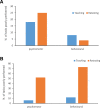Evaluation of medical student retention of clinical skills following simulation training
- PMID: 31311546
- PMCID: PMC6632214
- DOI: 10.1186/s12909-019-1663-2
Evaluation of medical student retention of clinical skills following simulation training
Abstract
Background: Adequate clinical skills training is a challenge for present day medical education. Simulation Based Education (SBE) is playing an increasingly important role in healthcare education worldwide to teach invasive procedures. The impact of this teaching on students along with retention of what is taught is not fully understood. The purpose of this study was to evaluate the retention levels of practical skills taught and assessed by SBE and to explore the degree of re-training required to restore decayed performance. In exploring this aim, the study further investigates how skilled performance decays over time and which dimensions of clinical skills were more likely to decay.
Methods: Study participants were 51 final year medical students. They were provided with online pre-course videos and procedural guides asynchronously with repeatedly access. 7 of the skills taught over 2 years using task trainers were selected. Following demonstration from faculty, students practiced in small groups with faculty facilitated supervision and peer support prior to formal testing. Score sheets with itemised procedure checklists detailing the minimum passing standard (MPS) for each skill were designed. To test retention of skills, 18 months later, there was an unannounced test to demonstrate proficiency in the skills. Students were asked to complete a questionnaire indicating how many times and where they had practiced or performed the skills.
Results: 55% of the students were deficient in 3 or more skills and 4% were not competent in 5 or more skills. A significant number of students had never practiced some skills following the initial teaching session. A relationship was noted with the number of times students self-declared that they had practiced and their performance. Decay is evident in both psychomotor and cognitive domains of the skills.
Conclusion: A curriculum with deliberate practice significantly increases the competence of students in defined clinical skills. Deliberate practice of clinical skills, under supervision of an engaged instructor, is a key component of the mastery model. Experiences and assessments in the clinical setting need to be augmented with focus on direct observation and focused feedback to reinforce the skills acquired in the simulated setting.
Keywords: Clinical skills; Deliberate practice; Medical school curriculum; Psychomotor and cognitive domains; Retention; Simulation.
Conflict of interest statement
The authors whose names are listed declare that they have no affiliations with or involvement in any organization or entity with any financial interest in this work and have no conflict of interest.
Figures


Similar articles
-
Simulation-Based Mastery Learning Improves Medical Student Performance and Retention of Core Clinical Skills.Simul Healthc. 2016 Jun;11(3):173-80. doi: 10.1097/SIH.0000000000000154. Simul Healthc. 2016. PMID: 27093509
-
ACS/ASE Medical Student Simulation-Based Skills Curriculum Study: Implementation Phase.J Surg Educ. 2019 Jul-Aug;76(4):962-969. doi: 10.1016/j.jsurg.2019.01.014. Epub 2019 Feb 21. J Surg Educ. 2019. PMID: 30797756
-
[Simulation-based training and OR apprenticeship for medical students : A prospective, randomized, single-blind study of clinical skills].Anaesthesist. 2016 Nov;65(11):822-831. doi: 10.1007/s00101-016-0221-0. Epub 2016 Sep 27. Anaesthesist. 2016. PMID: 27678137 Clinical Trial. German.
-
Take-Home Training in Laparoscopy.Dan Med J. 2017 Apr;64(4):B5335. Dan Med J. 2017. PMID: 28385174 Review.
-
Developing an undergraduate paediatric simulation workshop in a resource constrained setting: A practical 'how to' guide.J Paediatr Child Health. 2019 Jul;55(7):737-742. doi: 10.1111/jpc.14477. Epub 2019 Apr 23. J Paediatr Child Health. 2019. PMID: 31016797 Review.
Cited by
-
Determining the frequency of burn wound dressing for clinically competent nursing students: establishing standards based on learning curves.BMC Med Educ. 2023 Sep 18;23(1):678. doi: 10.1186/s12909-023-04673-8. BMC Med Educ. 2023. PMID: 37723561 Free PMC article.
-
360 virtual reality pediatric mass casualty incident: A cross sectional observational study of triage and out-of-hospital intervention accuracy at a national conference.J Am Coll Emerg Physicians Open. 2020 Aug 17;1(5):974-980. doi: 10.1002/emp2.12214. eCollection 2020 Oct. J Am Coll Emerg Physicians Open. 2020. PMID: 33145548 Free PMC article.
-
A comparative analysis of the impact of online, blended, and face-to-face learning on medical students' clinical competency in the affective, cognitive, and psychomotor domains.BMC Med Educ. 2022 Nov 1;22(1):753. doi: 10.1186/s12909-022-03777-x. BMC Med Educ. 2022. PMID: 36320031 Free PMC article.
-
Return on investment of rapid ICU workforce upskilling: an economic and cost-effectiveness analysis.Intensive Care Med. 2025 Aug;51(8):1453-1461. doi: 10.1007/s00134-025-08033-6. Epub 2025 Jul 21. Intensive Care Med. 2025. PMID: 40689971 Free PMC article.
-
Advancing Simulation-Based Education in Brazil: Bridging Research and Practice for Healthcare Excellence.Einstein (Sao Paulo). 2024 Jan 5;21Suppl 3(Suppl 3):eEDS3. doi: 10.31744/einstein_journal/2023EDS3. Einstein (Sao Paulo). 2024. PMID: 38198373 Free PMC article. No abstract available.
References
-
- Birdane A, Yazici HU, Aydar Y, Mert KU, Masifov M, Ulus T, et al. Effectiveness of cardiac simulator on the acquirement of cardiac auscultatory skills of medical students. Adv Clin Exp Med. 2012;21(6):791–798. - PubMed
-
- Davis B, Summers M. Applying Dale’s cone of experience to increase learning and retention: a study of student learning in a foundational leadership course. Q Science Proceedings. 2015;2015(4):6.
Publication types
MeSH terms
LinkOut - more resources
Full Text Sources

